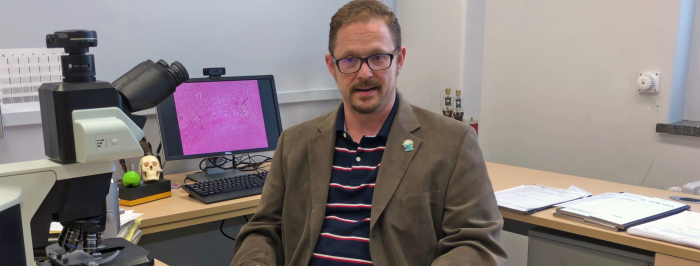“I enjoy knowledge for its own sake, but what gets me out of bed is that what we learn is going to help people fight some really difficult diseases.”
Dr. Joshua Aaron Sonnen is a neuropathologist with an interest in the neuropathology of age-related, neurodegenerative disorders including Alzheimer’s disease, Lewy body and Parkinson’s disease, vascular brain injury, traumatic brain injury and chronic traumatic encephalopathy, motor neuron disease, and frontotemporal dementia.
I previously worked in the neuropathology core of one of the Alzheimer’s disease research centers at the University of Washington in Seattle. Because of my experience there and work I’ve done with related studies, I was recruited to help examine the brains of people who were being treated in Quebec for age-related, neurodegenerative conditions such as Alzheimer’s disease, Parkinson’s disease, ALS, and dementia.
The point of my work is to understand what is happening in the brains of people who are dealing with complex, and currently incurable, disorders.
I’m currently working on a standardized, state-of-the-art, high-quality brain examination system so that the data we create at The Neuro can be used both here and around the world. The ultimate goal is to use this knowledge to benefit patients directly by understanding how to prevent, treat or cure diseases that affect them.
When people decide to offer their brains for research, they don’t donate them to a particular doctor or university, but rather to science.
We have a responsibility to be good stewards of these gifts and to maximize their value. The studies we do are most powerful when we share work and data with other scientists. Open science offers us a way to do this thoughtfully and responsibly.
I’ve always been fascinated by the brain and I think it holds some of the most interesting questions in science. I was initially exposed to the area of neurodegenerative disease early in my training at the University of Southern California. Later, during my fellowship training in neuropathology at The University of Washington, I discovered I could be a part of the science to increase our understanding of brain disease in a way that was clinically meaningful.
I enjoy knowledge for its own sake, but what gets me out of bed in the morning is the belief that what we learn is going to help people fight some really difficult diseases.
It’s great to be part of a highly-collaborative team where individuals bring their expertise together to create something greater than the sum of the parts.
Science and medicine are so big and complex that no one person can be an expert in everything. It’s exciting to be part of a team, not just with my neuropathology colleagues, but with The Neuro as a whole.
January 28 2020

